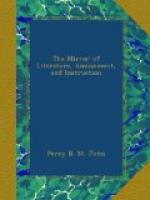Roscoe’s Lives of Eminent Lawyers.
* * * * *
AN UPRIGHT JUDGE.
The character of Sir Matthew Hale as a judge was splendidly pre-eminent. His learning was profound; his patience unconquerable; his integrity stainless. In the words of one who wrote with no friendly feeling towards him, “his voice was oracular, and his person little less than adored.” The temper of mind with which he entered upon the duties of the bench is best exemplified in the following resolutions, which appear to be composed on his being raised to the dignity of chief baron at the restoration.
“Things necessary to be continually had in remembrance:—
“1. That in the administration of justice I am intrusted for God, the king, and country; and therefore,
“2. That it be done—1. uprightly; 2. deliberately; 3. resolutely.
“3. That I rest not upon my own understanding or strength, but implore and rest upon the direction and strength of God.
“4. That in the exertion of justice I carefully lay aside my own passions, and not give way to them, however provoked.
“5. That I be wholly intent upon the business I am about, remitting all other cares and thoughts as unseasonable and interruptions.
“6. That I suffer not myself to be pre-possessed with any judgment at all, till the whole business and both parties be heard.
“7. That I never engage myself in the beginning of any cause, but reserve myself unprejudiced till the whole be heard.
“8. That in business capital, though my nature prompt me to pity, yet to consider there is a pity also due to the country.
“9. That I be not too rigid in matters purely conscientious, where all the harm is diversity of judgment.
“10. That I be not biassed with compassion to the poor, or favour to the rich, in point of justice.
“11. That popular or court applause or distaste have no influence in anything I do, in point of distribution of justice.
“12. Not to be solicitous what men will say or think, so long as I keep myself exactly according to the rule of justice.
“13. If in criminals it be a measuring cast, to incline to mercy and acquittal.
“14. In criminals that consist merely in words, where no more harm ensues, moderation is no injustice.




